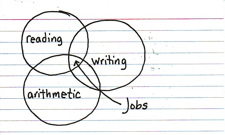 Last December I penned (keyed?) a relatively optimistic piece about education spending, with the conclusion that the textbook adoption market was in a crash but supplemental materials were in a short-term stall. I had it right on the first point and wrong on the second – we have seen a full blown market crash across the board this year. There are still sound reasons for long term optimism, but the near term remains grim.
Last December I penned (keyed?) a relatively optimistic piece about education spending, with the conclusion that the textbook adoption market was in a crash but supplemental materials were in a short-term stall. I had it right on the first point and wrong on the second – we have seen a full blown market crash across the board this year. There are still sound reasons for long term optimism, but the near term remains grim.
After the election I decided to read Nate Silver’s book “The Signal and the Noise: Why So Many Predictions Fail – But Some Don’t”. I was hoping to find insights on why I’d gotten it wrong, and so far I’ve not been disappointed.
Early on he outlines the distinction between risk and uncertainty in a way that is highly relevant to how we understand where we are in education publishing.
 The Education Business Blog
The Education Business Blog


 Special Education appears to be the first K12 market segment seeing the education stimulus dollars flow in volume.
Special Education appears to be the first K12 market segment seeing the education stimulus dollars flow in volume.
 The global economic meltdown is going to affect education budgets. States and School Districts will react to a drop in tax receipts and a credit freeze. This entry is an attempt to map out some of the possibilities for how the slowdown will play out in schools.
The global economic meltdown is going to affect education budgets. States and School Districts will react to a drop in tax receipts and a credit freeze. This entry is an attempt to map out some of the possibilities for how the slowdown will play out in schools. How will the economic downturn affect education budgets? How are executives at publishing houses and education technology firms planning for the recession?
How will the economic downturn affect education budgets? How are executives at publishing houses and education technology firms planning for the recession?